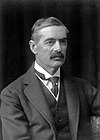Chamberlain war ministry
On 3 September 1939, Neville Chamberlain, Prime Minister of the United Kingdom, reconstructed his existing government so as to be suited for the Second World War.The most dramatic change to the ministerial line-up saw the return of Winston Churchill as First Lord of the Admiralty.The War Cabinet included Chamberlain, Hoare, Chancellor of the Exchequer Sir John Simon, Foreign Secretary Lord Halifax, Churchill, Secretary of State for Air Sir Kingsley Wood, Minister for Coordination of Defence Lord Chatfield, Lord Hankey (as Minister without Portfolio), and Secretary of State for War Leslie Hore-Belisha.Oliver Stanley replaced Hore-Belisha in January 1940 while Chatfield left the war cabinet in April 1940.The government ended on 10 May 1940 when Chamberlain resigned and was succeeded by Churchill who formed the War Coalition.

Fifth National Government of New ZealandGeorge VINeville Chamberlain1937–1940Conservative PartyLiberal National PartyNational LabourMajority(coalition)Labour PartyClement Attlee37th UK ParliamentNorway DebateFourth National GovernmentChurchill war ministrydeclaring war on GermanySecond World WarParliamentWinston Churchillnew ministryPhoney WarPrime Minister of the United Kingdomexisting governmentFirst Lord of the AdmiraltyLord CaldecoteLord MaughamLord ChancellorSir John AndersonSir Samuel HoareHome SecretaryLord Privy SealAnthony EdenSecretary of State for Dominion AffairsNational LiberalLiberal Partywar cabinetChancellor of the ExchequerSir John SimonForeign SecretaryLord HalifaxSecretary of State for AirSir Kingsley WoodMinister for Coordination of DefenceLord ChatfieldLord HankeyMinister without PortfolioSecretary of State for WarLeslie Hore-BelishaOliver StanleyWar CoalitionPrime MinisterLeader of the House of CommonsSamuel HoareJohn SimonSecretary of State for Foreign AffairsKingsley WoodLord StanhopeLord President of the CouncilLeader of the House of LordsJohn AndersonSecretary of State for the Home DepartmentMalcolm MacDonaldSecretary of State for the ColoniesLord ZetlandSecretary of State for India and BurmaJohn ColvilleSecretary of State for ScotlandPresident of the Board of TradeLord De La WarrPresident of the Board of EducationReginald Dorman-SmithMinister of AgricultureErnest BrownMinister of Labour and National ServiceWalter ElliotMinister of HealthEuan WallaceMinister of TransportLeslie BurginMinister of SupplyWilliam Shepherd MorrisonMinister of FoodChancellor of the Duchy of LancasterHerwald RamsbothamFirst Commissioner of WorksLord MacmillanMinister of InformationRonald CrossMinister of Economic WarfareWalter WomersleyMinister of PensionsGeorge TryonPostmaster GeneralLord WintertonPaymaster GeneralDonald SomervellAttorney GeneralTerence O'ConnorSolicitor GeneralDavid MargessonChief WhipMinister of ShippingJohn GilmourAndrew DuncanJohn ReithRobert HudsonLord WooltonFirst Lord of the TreasuryConservativeThe Viscount CaldecoteThe Earl StanhopeSir Samuel Hoare, BtLiberal NationalParliamentary Secretary to the TreasuryFinancial Secretary to the TreasuryHarry CrookshankLords of the TreasuryJames StuartThomas DugdalePatrick MunroStephen FurnessSir James EdmondsonPatrick Buchan-HepburnWilliam BoultonThe Viscount HalifaxParliamentary Under-Secretary of State for Foreign Affairs